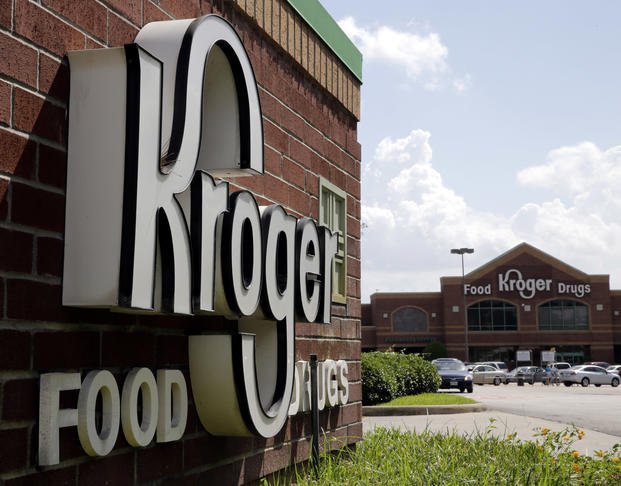Thousands of Tricare Pharmacy Locations Could Be Lost Due to Kroger-Albertsons Merger
5 min read
Kroger store in Houston
A planned merger of Kroger and Albertsons grocery corporations could slash the number of Tricare network pharmacies and send beneficiaries searching for a new place to get their prescription medications in the coming year.
Tricare beneficiaries who get prescription medications at a Kroger pharmacy or other store in the Kroger group received letters last week telling them that the company is leaving the Tricare pharmacy network effective Jan. 1. Its plans to acquire Albertsons, Safeway, Vons and other retail grocery chains could reduce the network by another 5,000 stores, according to the Military Officers Association of America.
The grocery giant announced the decision to leave the network last month in response to a contract offer from the Defense Department’s pharmacy benefits manager, Express Scripts, which was described by Kroger officials as not meeting “equitable and fair” standards.
“Since February, Kroger has attempted on dozens of occasions to negotiate in good faith with [Express Scripts Inc.], seeking a more equitable and fair contract that lowers cost, increases access, and delivers greater transparency — but there has been little to no progress to date,” Kroger officials said in a statement Sept. 30 announcing the termination of their agreement.
Kroger is set to acquire Albertsons and its affiliates by 2024, given regulatory approval, which could further reduce the number of network pharmacies.
Albertsons operates its own branded stores and other common retail grocery chains. A loss of these stores could reduce the Tricare retail pharmacy network by nearly 5,000 locations, in addition to Kroger and the nearly 15,000 small and independent pharmacies that were dropped in October.
“Just the independents leaving is a 25% cut to the number of pharmacies in the network. If you take out Kroger plus Albertsons, now you are talking about a 33% cut to the network if there is nothing done to bolster it otherwise,” said Karen Ruedisueli, director of government relations for health affairs with the Military Officers Association of America.
“It’s just really disturbing, because the pharmacy benefit was a key component of the compensation and benefits package to retain an all-volunteer force over two decades of war,” Ruedisueli added. “It’s just not OK.”
Neither Kroger nor Albertsons responded to a request for comment on the ongoing acquisition discussions and the potential impact on the Tricare pharmacy network.
An Express Scripts spokeswoman said that the company couldn’t speculate on the impact of the proposed merger but added that all Albertsons pharmacies are in the Tricare network.
“We will be prepared to make any necessary network changes to ensure that Tricare beneficiaries have convenient, affordable access to prescription medications,” said Justine Sessions, a spokeswoman for the pharmacy benefits manager.
In October, 14,963 retail pharmacies left the Tricare network rather than accept the terms of a contract offered by Express Scripts. Many of the pharmacies opted out of their contracts, but others never learned of the change, given their corporate structures, and were blindsided when Express Scripts announced that the dismissals were effective Oct. 24, rather than on Jan. 1 as was expected.
The Defense Health Agency and Express Scripts maintain that, despite the loss of those pharmacies, more than 90% of beneficiaries will have access to a pharmacy within a 15-minute drive.
Then, Kroger bailed, effective Jan. 1. The company not only controls Kroger Supermarkets, but also operates Ralphs, Dillons, Smith’s, King Soopers, Fry’s, Fred Meyer, Harris Teeter and other stores.
Jennifer Bittner, an Army spouse who volunteers with Exceptional Families of the Military, said she knows families who received letters this week telling them they had a month to transfer their prescriptions to either a military treatment facility, Express Scripts home delivery or another network pharmacy.
“They make it sound so simple, and it’s not simple whatsoever, especially for families that are [in the Exceptional Family Member Program] and have complex medical conditions,” Bittner said.
Following Kroger’s announcement, Express Scripts reached out to some of the pharmacies that were ousted in October, offering them the chance to rejoin the network under a new contract that would be effective on Jan. 15.
The terms of the new contract, however, were the same as those offered earlier this year and are untenable, according to Ronna Hauser, senior vice president of policy and pharmacy affairs at the National Community Pharmacists Association.
“[They are] severely underwater reimbursement terms that would leave our members losing money on 80+% of prescriptions billed for Tricare patients. The terms offered were so egregious,” Hauser said. “Especially with the news from Kroger, we are still dubious as to how Express Scripts can maintain network adequacy standards.”
She added that in the past several weeks, some of the association’s members that own multiple pharmacies have learned that some of their stores were removed from the network while others remain.
“They have no idea what the contract terms are for the stores that are still able to submit claims. It’s just a mess,” Hauser added.
Lawmakers have pressed the Defense Department for answers regarding pharmacy access for beneficiaries and the terms of the contract offered by Express Scripts, saying the loss of pharmacies would have a negative impact on some of the sickest patients, including children; those with cancer; veterans and their family members in long-term care; and those needing specialty medications, such as infusions.
“This leaves patients, including those with cancer and rare diseases, with the impossible choice of either switching to a new and often far away pharmacy or paying high out-of-pocket costs to stay with their established pharmacy. This is no way to treat our service members and their families,” wrote Rep. Buddy Carter, a Georgia Republican and pharmacist; Rep. Mike Rogers, R-Ala., the ranking member of the Armed Services Committee; and others in a letter Nov. 21.
The lawmakers requested that the Defense Health Agency attend a listening session with patients, pharmacists and others affected by the change.
Ruedesueli said her organization is lobbying to reverse the cuts to the network and hopes the DHA will address the concerns but “realizes that legislation might be necessary.”
“We appreciate the many congressional offices that have sent letters on the matter and look forward to working with them to achieve protections in statute to maintain the integrity of the Tricare pharmacy program. Our beneficiaries, including many vulnerable populations, are counting on it,” she said.





